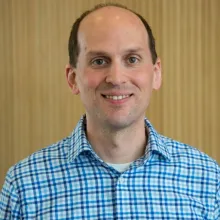
When
Where
Webinar Materials:
Video-recording:
Presentation Slides (download .pdf from CyVerse Data Store)
Other Materials/Links:
Donald Danforth Plant Science Center
About the Webinar:
With the push towards precision agriculture to solve urgent global food production and climate change challenges we are facing, plant biologists and computational scientists now have more tools than ever, like PlantCV, to do image-based plant phenotyping within their own research program. Presenter Noah Fahlgren, one of the creators of Plant Computer Vision (PlantCV), gives an overview of how PlantCV is built, what research can be done with PlantCV, and how users can apply it to their own projects. He explains some of the built-in tools that include traditional image analysis and machine learning methods, and how these can be combined with other image analysis tools from the Python community. Noah then demonstrates how to build your own image analysis workflows on your laptop, on your own servers, or on CyVerse using VICE. If you've ever wanted to do image-based plant (or other organisms!) phenotyping, this webinar will show you that image-based analysis in your research is achievable and that you do not need an expensive system for imaging to get started now!
About the Presenter:

Noah Fahlgren is Director of the Data Science Facility, a research group at the Donald Danforth Plant Science Center, that uses and develops computational approaches and infrastructure that leverage large datasets to address biological problems. Although he does computational research now, his background is in biology, with his PhD work in Molecular and Cellular Biology. During graduate school, he started doing a lot of high-throughput sequencing (his PI had one of the first Illumina machines, still had the Solexa name on it!) and it became clear that he to learn some programming in order to work with that data--little did he know that that’s what he would end up really enjoying working on! (there's hope for all of us!). Noah says, "It’s given me the ability to converse with both biologist and computational scientists, which I enjoy. I believe in open source software and reproducible research. It’s important that the tools we build with public funding are accessible to all, and that the research we publish has all the data, methods, and other information needed to use and reuse it available" (...which is why he has made PlantCV available to the CyVerse community!).

